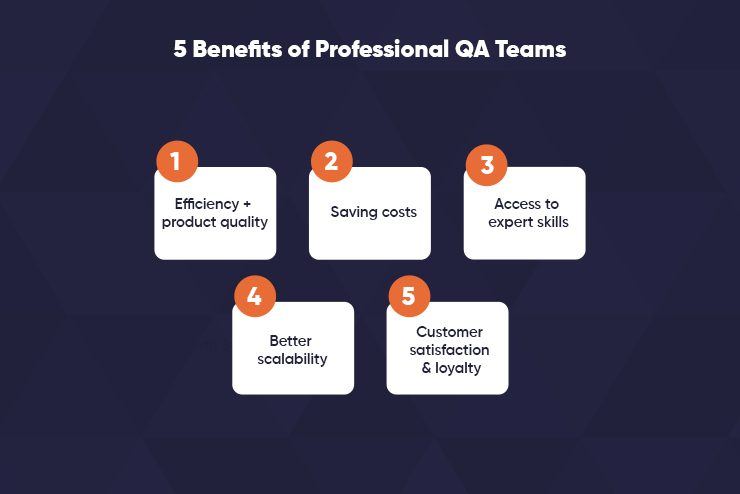Signs Your Software Needs QA Testing: When to Invest in Professional Testing Services
QA testing is a major part of a software development strategy, as it’s there to ensure software works as intended: securely, reliably, and bug-free. Many successful companies consider it indispensable.
Still, others may find it unnecessary, often opting to skip QA in favor of investing assets into other parts of business development. And while it’s true that every business is singular and has unique needs, skipping QA often leads to an increase in post-release bugs, poor user experience, security risks, and ultimately damage to the brand’s reputation. Overall, it’s easy to see that skipping QA is not a very smart business idea.

In this article, we will identify clear warning signs that a business is in need of professional QA. You can browse the list of symptoms and see if it’s time to bring in a professional software testing team.
Common Signs That It’s Time for QA Experts
Startups rarely focus on testing outright, often citing is at an unnecessary investment in the early stages, preferring to focus on QA as business scales up.
However, by that point, the software has grown and become more complex, so testing might need some time to match the new pace. And while testers are trying to get caught up with everything, your brand might experience a slew of unpleasant situations, starting with missed deadlines to negative user experiences to even damaged reputations.
But long before anything bad happens, it’s possible to act preemptively and save yourself from unfortunate events by paying attention to the signs. Here are some of the most common warning signals that your software is in dire need of professional testing.
More Bugs While Detection Deteriorates
One of the first things that brands notice as a clear sign of a profound lack of pro QA is an escalated defect volume, or more simply, an increase in bugs and defects post-release.
It is even worse when it is paired up with a decrease in detection performance.
Simply put, if users are catching bugs that your team previously missed, or more bugs pop up as time goes on, you might have an entire set of problems on your hands unless you do something about that – either increasing the coverage or updating tools used for testing.
Failure to catch bugs during the development phase can seriously affect production, which is why it is taken as one of the biggest and most important signs that you need professional software testing.
Testing Bottlenecks that Cause Project Delays
Hitting deadlines is crucial, so failure to do that may cost the company a lot if left untreated. The immediate consequence of a product delay is a loss of profits, but reputation damage is a close second. And that’s just the beginning of the mountain of problems that may arise if products keep missing launch dates.
If QA phases are causing launch delays or something similar, it might be a sign that your current QA team is either under-resourced or is employing wrong processes.
The best thing that can help solve this issue is either hiring a full QA team of professional testers or identifying what are the main lacks and providing it to the team.
A Lack of Skills in the Team
If the team is not skilled enough – or simply lack the specialized skills necessary for the specific testing done – it may take longer to complete (which leads to launch delays) or might cost more. Neither option is good.
A team that is not skilled enough may not perform well under pressure, leading to rushed work that is not thorough enough.
Some of the ways that this then may manifest as a problem are a lack of dedicated testers, overworked developers, and a profound lack of automated pipelines and structured practices. All this spells trouble in the long run, and the best way to solve it is to hire a professional team.
Inconsistencies Across Platforms
Another sign that the current state of affairs is inadequate is a lack of consistency in testing results across different platforms. For example, if there are issues that have appeared on specific browsers or OS versions that do not appear on other platforms or devices.
This points to lacks in compatibility and regression testing. However, it requires more than just a brief focus on these areas; a structured approach is the best way to solve this issue for good. A solid QA team of experts with specialized skills can be of great help for this as it can work on building cohesion with the development team, making the process faster and more efficient.
Testing Becomes an Afterthought and Costs Soar
Companies that do not consider testing important often perform it in post-development, nearing the end of the process. Unfortunately, this often creates more issues than it solves, as testing at late stages may require more rework – which takes time – than if it were done during development.
Catching issues on time is pivotal because quite frankly, it makes the process a lot easier. And cheaper, too – subsequent testing requires time and resources, which raise the costs considerably.
It’s much easier to perform testing proactively, by identifying issues early on and solving them before they snowball into bigger issues.
Modern QA Approaches That Help Solve These Issues
There is a myriad of ways to approach testing. Depending on what you need, you can use a string of different technologies for testing purposes.
Some of the most common approaches that can combat the warning signs include test automation, load and performance testing, compatibility testing, as well as security testing.
Automation is one of the key tools to use to make sure QA tests are running smoothly and without hiccups. It’s incredibly cost-effective and reliable, making it one of the best practices in software testing today.
With automation and continuous testing, companies boost regression detection, pipeline integration, and get feedback faster than usual.
Another key aspect of QA is testing reliability and compliance, which is where performance and security testing come into play. Regardless of what the company chooses to focus on, it’s crucial to first identify the issues and then build a well-structured approach to solving the issues with a QA team that is reliable.
Why Hire Professional QA?
How can you profit from working with a professional team instead of somebody else?

Let’s start with the most obvious one: quality and efficiency. Simply put, employing highly skilled individuals to work on the software will ensure a higher degree of quality of QA tests. Well, more experience and better skills make the team faster and more efficient. This, in turn, shortens the release cycle, landing the product on the market faster than when working with non-pros.
And although a pro QA team might lead to higher costs at first, as it’s necessary to pay for the added skills and experience, it will ultimately end up saving you money, instead of costing more.
The earlier the defects are detected, the faster they can be resolved, so the fixing costs are reduced drastically. In fact, the Systems Sciences Institute at IBM reported that early testing is 6x less expensive than testing later in the implementation phase.
Introducing professionals into the fold will therefore save you money by shortening the process and testing throughout the development process. Plus, professional teams often offer a fantastic scope of specialized skills that you do not have to outsource – it’s all within one team in one package.
And as time goes on and the business grows, an experienced team of professional testers will have no problems adjusting to the pace as the company reaches new levels.
Finally, one of the most important and long-lasting positive effects of working with professionals is the increase in customer satisfaction and retention. High-quality products, minimal defects, and polished products inspire loyalty in customers faster and better.
When to Hire Experts
Although the optimal solution is to work with a professional team right from the start, it’s not often feasible or cost-effective. However, it’s important to keep track of warning signs to understand when it’s the right time to call in QA experts.
Here are the signal moments where professional services can make the biggest difference:
-
Right before major launches or update rollouts.
-
After a critical issue in production that impacted the clients.
-
Ahead of scaling up the team or workload.
-
Before switching to new QA technologies that the current team is inexperienced in.
-
When facing security or regulatory requirements.
In other words, the best time to start working with experts is right before a massive new change or the beginning of a new chapter as that can help the team make an easier transition and adjust to new conditions better.
Choosing the Right QA Partner: What to Look For
Identifying the warning signs and deciding to acquire a team of QA testing professionals is just half of the work. Choosing the right QA partner is a crucial step that can have a great impact on your product strategy.
Essentially, reliable QA teams of professionals have:
-
A clear QA strategy created before the start
-
Expertise with domain and compliance guidelines, especially with security load testing
-
Necessary methodologies and tools for testing (including manual, automated, and mixed)
-
Full transparency in reporting, metrics, and analysis
-
Scalability supported through in-house or offshore resourcing, or even outsourcing
Before making the final decision, it’s important to get in touch with the team and inquire about the scope of services they can offer that you require. Clear and transparent communication right from the start is key in ensuring seamless integration of QA testers and nurturing their connection to the development team.
To build an effective QA team, look into the roles you might require, and the size of the team you might need. The most sought-after roles include Automation Engineers, Manual Testers, QA Managers, and Test Architects, but that depends solely on the company in need of professional QA and their needs.
Conclusion
So, in short, the following signs are not to be trifled with:
-
The volume of defects and bugs is rising
-
Product launches are getting delayed
-
Testing results do not match across platforms
-
Customers are complaining
-
Testing costs are only going up
-
The team lacks the necessary skills
If you happen to notice any of them, you might want to consider changing the QA strategy. Professional QA services are not simply an added cost, but rather a very powerful tool that can help in ensuring the high-quality of products faster and easier than ever before.
If you still have doubts, feel free to contact our team and book a consultation to discuss how hiring a professional team can benefit your company specifically.
